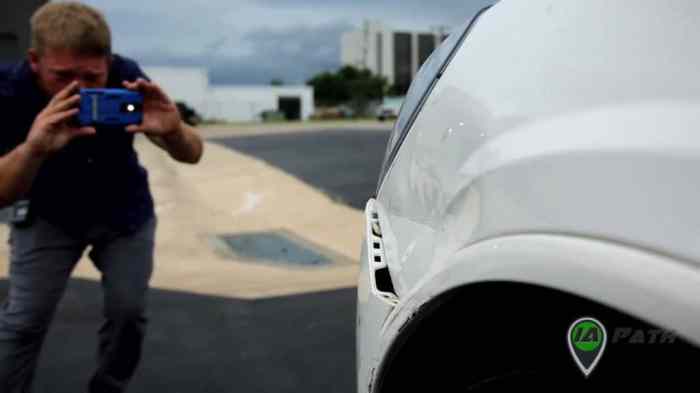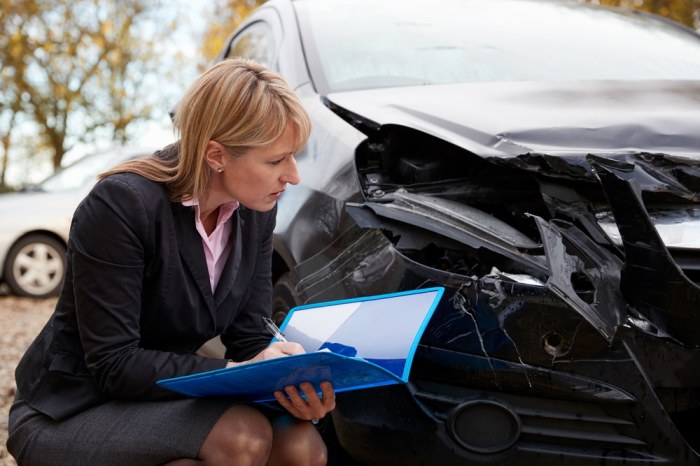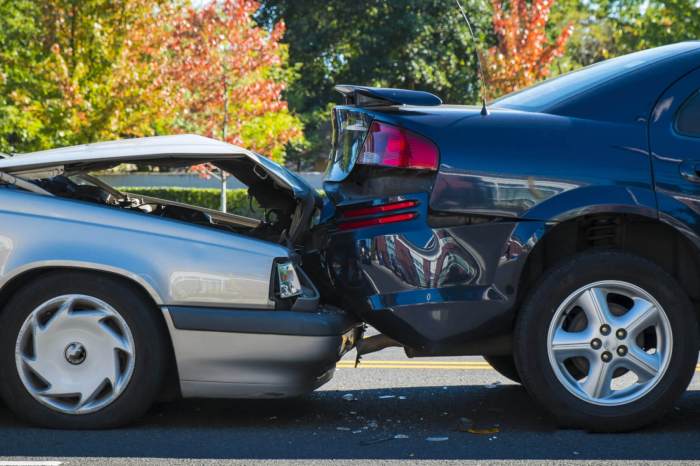Auto damage appraiser – practice test – Embark on an educational journey with the Auto Damage Appraiser Practice Test, an indispensable tool for aspiring and experienced appraisers alike. This comprehensive resource provides a structured approach to enhance your understanding of auto damage assessment principles, ensuring you deliver precise and reliable valuations.
As you delve into the intricacies of vehicle damage analysis, you will gain invaluable insights into the various types of damage, assessment methodologies, and factors influencing vehicle value. Practice tests serve as a crucial stepping stone, empowering you to refine your skills and excel in this demanding profession.
Introduction
An auto damage appraiser is a professional who inspects and assesses the extent of damage to vehicles involved in accidents or other incidents. They determine the cost of repairs and provide a report to insurance companies, body shops, or other parties involved.
Practice tests are essential for auto damage appraisers as they provide an opportunity to refine their skills, identify areas for improvement, and enhance their overall knowledge and proficiency in the field. These tests simulate real-life scenarios and cover various aspects of auto damage appraisal, including vehicle inspection, damage assessment, repair cost estimation, and report writing.
Importance of Practice Tests
- Skill Refinement:Practice tests allow appraisers to hone their inspection and assessment techniques, ensuring accuracy and consistency in their evaluations.
- Knowledge Enhancement:By exposing appraisers to a wide range of scenarios, practice tests broaden their knowledge base and improve their understanding of industry standards and best practices.
- Identification of Weaknesses:Practice tests help appraisers identify areas where they need additional training or support, enabling them to address gaps and strengthen their overall competence.
- Preparation for Certification:Many professional organizations offer certification programs for auto damage appraisers. Practice tests can serve as a valuable preparation tool for these exams, increasing the likelihood of success.
Key Concepts
Understanding the various types of auto damage, assessment methods, and factors influencing the value of damaged vehicles is crucial for auto damage appraisers.
Types of Auto Damage
- Collision Damage:Occurs when a vehicle collides with another vehicle, object, or structure.
- Hail Damage:Caused by hail impact, leading to dents, scratches, and broken glass.
- Vandalism Damage:Intentional damage to a vehicle, such as broken windows, scratched paint, or slashed tires.
- Weather Damage:Damage resulting from extreme weather conditions, such as floods, storms, or falling objects.
- Mechanical Damage:Internal damage to the vehicle’s engine, transmission, or other components.
Methods of Auto Damage Assessment, Auto damage appraiser – practice test
- Visual Inspection:A thorough examination of the vehicle’s exterior and interior to identify visible damage.
- Diagnostic Testing:Using specialized equipment to diagnose mechanical damage and assess the extent of internal damage.
- Repair Estimates:Obtaining estimates from repair shops to determine the cost of repairs.
- Total Loss Assessment:Determining if the cost of repairs exceeds the vehicle’s actual cash value, resulting in a total loss.
Factors Affecting the Value of a Damaged Vehicle
- Severity of Damage:The extent and severity of the damage significantly impact the vehicle’s value.
- Age and Condition of the Vehicle:Older vehicles with higher mileage typically have a lower value than newer vehicles in good condition.
- Make and Model:The make and model of the vehicle can affect its value, as some vehicles hold their value better than others.
- Salvage Value:The value of the vehicle after it has been declared a total loss, which is typically determined by the cost of scrap metal and reusable parts.
- Insurance Coverage:The type and amount of insurance coverage can impact the value of a damaged vehicle.
Practice Test Structure

Practice tests for auto damage appraisers are designed to assess the candidate’s knowledge and skills in estimating the cost of repairs for damaged vehicles.
These tests typically consist of a variety of question types, including multiple choice, true/false, and short answer. Candidates may also be required to complete a written estimate for a damaged vehicle.
Time Limits and Scoring Systems
Practice tests typically have a time limit, which varies depending on the length and difficulty of the test. Candidates are typically given between 60 and 120 minutes to complete the test.
The scoring system for practice tests also varies. Some tests are scored on a pass/fail basis, while others are scored on a point system. Candidates who score a passing grade on a practice test are typically eligible to take the actual auto damage appraiser certification exam.
Practice Test Preparation
Adequately preparing for an auto damage appraiser practice test is crucial for success. By following effective preparation strategies and utilizing appropriate study materials, individuals can significantly enhance their chances of achieving a desirable outcome.
To begin, it is essential to gather high-quality study materials. These may include textbooks, online resources, and practice tests specifically designed for auto damage appraisers. These materials should cover the core concepts and principles of auto damage appraisal, including estimating techniques, vehicle construction, and damage analysis.
Study Tips
- Allocate sufficient time for studying and create a structured study plan.
- Break down the material into smaller, manageable chunks for effective retention.
- Use active learning techniques such as flashcards, practice questions, and mock exams.
- Seek clarification on any concepts that are not fully understood.
- Review the material regularly to reinforce understanding and identify areas that need further attention.
Practice Test Strategies
- Take practice tests under timed conditions to simulate the actual exam environment.
- Analyze the results carefully, identifying strengths and weaknesses.
- Focus on improving areas where performance was lacking.
- Review the questions that were answered incorrectly and seek clarification on the correct answers.
- Practice time management skills to ensure efficient completion of the exam within the allotted time.
Practice Test Analysis
Analyzing the results of a practice test is a crucial step in identifying areas for improvement and developing a study plan. It involves carefully reviewing your answers, understanding why you got them right or wrong, and identifying patterns in your mistakes.
Identifying Areas for Improvement
There are several ways to identify areas for improvement:
-
-*Review incorrect answers
Determine why you got these answers wrong. Was it due to lack of knowledge, misunderstanding of the question, or careless mistakes?
-*Identify patterns in errors
Look for common mistakes you made throughout the test. This could indicate specific concepts or question types that need attention.
-*Compare your answers to the answer key
Note the questions where you had significant discrepancies with the correct answers. These are areas where you need to focus your studies.
Setting Goals and Developing a Study Plan
Based on your analysis, set realistic goals for improvement. Focus on specific areas where you need to enhance your knowledge and skills.
-
-*Break down large goals
Divide your goals into smaller, manageable chunks to make them less overwhelming.
-*Prioritize your studies
Focus on the most important concepts and question types first.
-*Allocate time for practice
Schedule regular practice sessions to reinforce your learning and improve your timing.
-*Seek additional resources
Consider using textbooks, online resources, or tutoring to supplement your studies.
-*Track your progress
Regularly review your practice test results to monitor your improvement and make adjustments to your study plan as needed.
Benefits of Practice Tests

Practice tests offer numerous benefits for auto damage appraisers, enhancing their accuracy, speed, and confidence. By simulating real-world scenarios, practice tests provide a controlled environment for appraisers to hone their skills and identify areas for improvement.
Accuracy and Speed
- Practice tests expose appraisers to a wide range of damage scenarios, improving their ability to accurately assess and document damage.
- The timed nature of practice tests helps appraisers develop a sense of urgency and improves their speed in completing appraisals.
Confidence and Weaknesses
- Successfully completing practice tests boosts an appraiser’s confidence in their abilities, empowering them to handle complex damage assessments with assurance.
- Practice tests highlight areas where an appraiser may need additional training or support, enabling them to address weaknesses and enhance their overall proficiency.
Conclusion

Practice tests are an invaluable resource for auto damage appraisers who want to improve their skills and knowledge. By taking practice tests, appraisers can identify areas where they need additional training, improve their time management skills, and build confidence in their abilities.
As the auto damage appraisal industry continues to evolve, practice tests will become increasingly important for appraisers who want to stay ahead of the competition and provide the best possible service to their clients.
We encourage all auto damage appraisers to take advantage of practice tests to improve their skills and knowledge. By doing so, appraisers can ensure that they are providing the most accurate and reliable appraisals possible.
Questions Often Asked: Auto Damage Appraiser – Practice Test
What are the benefits of taking an auto damage appraiser practice test?
Practice tests offer numerous benefits, including improved accuracy in damage assessment, enhanced speed and efficiency in completing appraisals, and increased confidence in your abilities.
How do I prepare for an auto damage appraiser practice test?
Effective preparation involves familiarizing yourself with industry standards, studying relevant materials, and utilizing practice questions to identify areas for improvement.
What types of questions can I expect on an auto damage appraiser practice test?
Practice tests typically cover a range of topics, including damage identification, repair procedures, vehicle valuation, and ethical considerations.